- Home
- Philip Roth
Reading Myself and Others Page 2
Reading Myself and Others Read online
Page 2
“The Conversion of the Jews,” for instance, a story I wrote when I was twenty-three, reveals at its most innocent stage of development a budding concern with the oppressiveness of family feeling and with the binding ideas of religious exclusiveness which I had experienced first-hand in ordinary American-Jewish life. A good boy named Freedman brings to his knees a bad rabbi named Binder (and various other overlords) and then takes wing from the synagogue into the vastness of space. Primitive as this story seems to me now—it might better be called a daydream—it nonetheless evolved out of the same preoccupations that led me, years later, to invent Alexander Portnoy, an older incarnation of claustrophobic little Freedman, who cannot cut loose from what binds and inhibits him quite so magically as the hero I imagined humbling his mother and his rabbi in “The Conversion of the Jews.” Ironically, where the boy in the early story is subjugated by figures of real stature in his world, whose power he for the moment at least is able to subvert, Portnoy is less oppressed by these people—who have little real say in his life anyway—than he is imprisoned by the rage that persists against them. That his most powerful oppressor by far is himself is what makes for the farcical pathos of the book—and also what connects it with my preceding novel, When She Was Good, where again the focus is on a grown child’s fury against long-standing authorities believed by her to have misused their power.
The question of whether I can ever free myself from these forms of power assumes that I experience family and religion as power and nothing else. It is much more complicated than that. I have never really tried, through my work or directly in my life, to sever all that binds me to the world I came out of. I am probably right now as devoted to my origins as I ever was in the days when I was indeed as powerless as little Freedman and, more or less, had no other sane choice. But this has come about only after subjecting these ties and connections to considerable scrutiny. In fact, the affinities that I continue to feel toward the forces that first shaped me, having withstood to the degree that they have the assault of imagination and the test of sustained psychoanalysis (with all the cold-bloodedness that entails), would seem by now to be here to stay. Of course I have greatly refashioned my attachments through the effort of testing them, and over the years have developed my strongest attachment to the test itself.
Our Gang is a desecration of President Nixon and it takes its theme from a statement on abortion. In what period of your life have you most strongly felt the weight of political power as a moral coercion and how did you react to it? Do you feel that the element of the grotesque, which you often use, is the only means by which one can rebel and fight against such power?
I suppose I most strongly felt political power as moral coercion while growing up in New Jersey during World War II. Little was asked of an American schoolchild, other than his belief in the “war effort,” but that I gave with all my heart. I worried over the welfare of older cousins who were off in the war zone, and wrote them long “newsy” letters to keep up their morale; I sat by the radio with my parents listening to Gabriel Heatter every Sunday, hoping upon hope that he had good news that night; I followed the battle maps and front-line reports in the evening paper; and on weekends I participated in the neighborhood collection of paper and tin cans. I was twelve when the war ended, and during the next few years my first serious political allegiances began to take shape. My entire clan—parents, aunts, uncles, cousins—were devout New Deal Democrats. In part because they identified him with Roosevelt, and also because they were by and large lower-middle-class people sympathetic to labor and the underdog, many of them voted for Henry Wallace, the Progressive Party candidate for President in 1948. I’m proud to say that Richard Nixon was known as a crook in our kitchen some twenty-odd years before this dawned on the majority of Americans as a real possibility. I was in college during Joe McCarthy’s heyday—which is when I began to identify political power with immoral coercion. I reacted by campaigning for Adlai Stevenson and writing a long angry free-verse poem about McCarthyism for the college literary magazine.
The Vietnam War years were the most “politicized” of my life. I spent my days during this war writing fiction, none of which on the face of it would appear to connect to politics (though there was a time when I at least associated the rhetoric employed by the heroine of When She Was Good to disguise from herself her vengeful destructiveness with the kind of language our government used when they spoke of “saving” the Vietnamese by means of systematic annihilation). But by being “politicized” I mean something more telling than writing about politics or even taking direct political action. I mean something akin to what ordinary citizens experience in countries like Czechoslovakia or Chile: a daily awareness of government as a coercive force, its continuous presence in one’s thoughts as far more than just an institutionalized, imperfect system of necessary controls. In sharp contrast to Chileans or Czechs, we hadn’t personally to fear for our safety and could be as outspoken as we liked, but this did not diminish the sense of living in a country with a government morally out of control and wholly in business for itself. Reading the morning New York Times and the afternoon New York Post, watching the seven and then again the eleven o’clock TV news—all of which I did ritualistically—became for me like living on a steady diet of Dostoevsky. Rather than fearing for the well-being of my own kin and country, I now felt toward America’s war mission as I had toward the Axis goals in World War II. One even began to use the word “America” as though it was the name, not of the place where one had been raised and to which one had a strong spiritual attachment, but of a foreign invader that had conquered the country and with whom one refused, to the best of one’s strength and ability, to collaborate. Suddenly America had turned into “them”—and with this sense of dispossession and powerlessness came the virulence of feeling and rhetoric that often characterized the anti-war movement.
I don’t think—to come to your last question—that Our Gang uses the “element of the grotesque.” Rather, it tries to objectify in a style of its own that element of the grotesque that is inherent in the moral character of a Richard Nixon. He, not the satire, is what is grotesque. Of course there have been others as venal and lawless in American politics, but even a Joe McCarthy was more identifiable as human clay than this guy is. The wonder of Nixon (and contemporary America) is that a man so transparently fraudulent, if not on the edge of mental disorder, could ever have won the confidence and approval of a people who generally require at least a little something of the “human touch” in their leaders. It’s strange that someone so unlike the types most admired by the average voter—in any Norman Rockwell drawing, Nixon would have been cast as the fuddy-duddy floorwalker or the prissy math teacher school kids love to tease; never the country judge, the bedside doctor, or the trout-fishin’ dad—could have passed himself off to this Saturday Evening Post America as, of all things, an American.
Finally: “rebelling” or “fighting” against outside forces isn’t what I take to be at the heart of my writing. Our Gang is only one of eight disparate works of fiction I’ve written in the past fifteen years, and even there what most engaged me had to do with expressiveness, with problems of presentation, rather than bringing about change or “making a statement.” Over the years, whatever serious acts of rebelliousness I may have engaged in as a novelist have been directed far more at my own imagination’s system of constraints and habits of expression than at the powers that vie for control in the world.
On Portnoy’s Complaint*
Would you say something about the genesis of Portnoy’s Complaint? How long has the idea of the book been in mind?
Some of the ideas that went into the book have been in my mind ever since I began writing. I mean particularly ideas about style and narration. For instance, the book proceeds by means of what I began to think of while writing as “blocks of consciousness,” chunks of material of varying shapes and sizes piled atop one another and held together by association rather than chronology. I tried somethin
g vaguely like this in Letting Go, and have wanted to come at a narrative in this way again—or break down a narrative this way—ever since.
Then there’s the matter of language and tone. Beginning with Goodbye, Columbus, I’ve been attracted to prose that has the turns, vibrations, intonations, and cadences, the spontaneity and ease, of spoken language, at the same time that it is solidly grounded on the page, weighted with the irony, precision, and ambiguity associated with a more traditional literary rhetoric. I’m not the only one who wants to write like this, obviously, nor is it a particularly new aspiration on the planet; but that’s the kind of literary idea, or ideal, I was pursuing in this book.
I was thinking more in terms of the character and his predicament when I asked how long you had in mind the “idea of the book.”
I know you were. That’s partly why I answered as I did.
But surely you don’t intend us to believe that this volatile novel of sexual confession, among other things, had its conception in purely literary motives?
No, I don’t. But the conception is really nothing, you know, beside the delivery. My point is that until my “ideas”—about sex, guilt, childhood, about Jewish men and their Gentile women—were absorbed by an overall fictional strategy and goal, they were ideas not unlike anybody else’s. Everybody has “ideas” for novels; the subway is jammed with people hanging from the straps, their heads full of ideas for novels they cannot begin to write. I am often one of them.
Given the book’s openness, however, about intimate sexual matters, as well as its frank use of obscenity, do you think you would have embarked upon such a book in a climate unlike today’s? Or is the book appropriate to these times?
As long ago as 1958, in The Paris Review, I published a story called “Epstein” that some people found very disgusting in its intimate sexual revelations; and my conversation, I have been told, has never been as refined as it should be. I think that many people in the arts have been living in a “climate like today’s” for some time now; the mass media have just caught up, that’s all, and with them, the general public. Obscenity as a usable and valuable vocabulary, and sexuality as a subject, have been available to us since Joyce, Henry Miller, and Lawrence, and I don’t think there’s a serious American writer in his thirties who has felt restricted by the times particularly, or suddenly feels liberated because these have been advertised as the “swinging sixties.” In my writing lifetime the use of obscenity has, by and large, been governed by literary taste and tact and not by the mores of the audience.
What about the audience? Don’t you write for an audience? Don’t you write to be read?
To write to be read and to write for an “audience” are two different matters. If you mean by an audience a particular readership which can be described in terms of its education, politics, religion, or even by its literary tone, the answer is no. When I’m at work I don’t really have any group of people in mind whom I want to communicate with; what I want is for the work to communicate itself as fully as it can, in accordance with its own intentions. Precisely so that it can be read, but on its own terms. If one can be said to have an audience in mind, it is not any special-interest group whose beliefs and demands one either accedes to or challenges, but those ideal readers whose sensibilities have been totally given over to the writer, in exchange for his seriousness.
An example which will also get us back to the issue of obscenity. My new book, Portnoy’s Complaint, is full of dirty words and dirty scenes; my last novel, When She Was Good, had none. Why is that? Because I’ve suddenly become a “swinger”? But then apparently I was “swinging” all the way back in the fifties, with “Epstein.” And what about the dirty words in Letting Go? No, the reason there is no obscenity, or blatant sexuality either, in When She Was Good is that it would have been disastrously beside the point.
When She Was Good is, above all, a story about small-town Middle Westerners who more than willingly experience themselves as conventional and upright people; and it is their own conventional and upright style of speech that I chose as my means of narration—or, rather, a slightly heightened, somewhat more flexible version of their language, but one that drew freely upon their habitual clichés, locutions, and banalities. It was not, however, to satirize them, in the manner, say, of Ring Lardner’s “Haircut,” that I settled eventually on this modest style, but rather to communicate, by their way of saying things, their way of seeing things and judging them. As for obscenity, I was careful, even when I had Roy Bassart, the young ex-G.I. in the novel, reflecting—had him safely walled-up in his own head—to show that the furthest he could go in violating a taboo was to think “f. this and f. that.” Roy’s inability to utter more than the initial of that famous four-letter word, even to himself, was the point I was making.
Discussing the purposes of his art, Chekhov makes a distinction between “the solution of the problem and a correct presentation of the problem”—and adds, “only the latter is obligatory for the artist.” Using “f. this and f. that,” instead of The Word Itself, was part of the attempt to make a correct presentation of the problem.
Are you suggesting, then, that in Portnoy’s Complaint a “correct presentation of the problem” requires a frank revelation of intimate sexual matters, as well as an extensive use of obscenity?
Yes, I am. Obscenity is not only a kind of language that is used in Portnoy’s Complaint, it is very nearly the issue itself. The book isn’t full of dirty words because “that’s the way people talk”; that’s one of the least persuasive reasons for using the obscene in fiction. Besides, few people actually talk the way Portnoy does in this book—this is a man speaking out of an overwhelming obsession: he is obscene because he wants to be saved. An odd, maybe even mad, way to go about seeking personal salvation; but, nonetheless, the investigation of this passion, and of the combat that it precipitates with his conscience, is what’s at the center of the novel. Portnoy’s pains arise out of his refusal to be bound any longer by taboos which, rightly or wrongly, he experiences as diminishing and unmanning. The joke on Portnoy is that for him breaking the taboo turns out to be as unmanning in the end as honoring it. Some joke.
So, I wasn’t simply after verisimilitude here; I wanted to raise obscenity to the level of a subject. You may remember that, at the conclusion of the novel, the Israeli girl (whose body Portnoy has been wrestling her for on the floor of his Haifa hotel room) says to him, with loathing, “Tell me, please, why must you use that word all the time?” I gave her this question to ask him—and to ask at the end of this novel—altogether deliberately: Why he must is what the book is all about.
Do you think there will be Jews who will be offended by this book?
I think there will even be Gentiles who will be offended by this book.
I was thinking of the charges that were made against you by certain rabbis after the appearance of Goodbye, Columbus. They said you were “anti-Semitic” and “self-hating,” did they not?
In “Writing About Jews,”* an essay I published in Commentary, in December 1963, I replied at length to those charges. Some critics also said that my work furnished “fuel” for anti-Semitism. I’m sure these charges will be made again—though the fact is (and I think there’s even a clue to this in my fiction) that I have always been far more pleased by my good fortune in being born a Jew than my critics may begin to imagine. It’s a complicated, interesting, morally demanding, and very singular experience, and I like that. I find myself in the historic predicament of being Jewish, with all its implications. Who could ask for more? But as for those charges you mention—yes, they probably will be leveled at me. Because of the U.N. condemnation of Israeli “aggression,” and anti-Semitic rage flaring up in the black community, many American Jews must surely be feeling more alienated than they have in a long time; consequently, I don’t think it’s a moment when I can expect a book as unrestrained as this one to be indulged or even tolerated, especially in those quarters where I was not exactly hailed as the Mes
siah to begin with. I’m afraid that the temptation to quote single lines out of the entire fictional context will be just about overwhelming on upcoming Saturday mornings. The rabbis have got their indignation to stoke, just as I do. And there are sentences in that book upon which a man could construct a pretty indignant sermon.
I have heard some people suggest that your book was influenced by the nightclub act of Lenny Bruce. Would you consider Bruce, or other stand-up comics such as Shelley Berman or Mort Sahl, or even The Second City comics, an influence upon the comic methods you employ in Portnoy’s Complaint?
Not really. I would say I was more strongly influenced by a sit-down comic named Franz Kafka and a very funny bit he does called “The Metamorphosis.” Interestingly, the only time Lenny Bruce and I ever met and talked was in his lawyer’s office, where it occurred to me that he was just about ripe for the role of Joseph K. He looked gaunt and driven, still determined but also on the wane, and he wasn’t interested in being funny—all he could talk about and think about was his “case.” I never saw Bruce perform, though I’ve heard tapes and records, and since his death I’ve watched a movie of one of his performances and read a collection of his routines. I recognize and admire in him what I used to like about The Second City company at its best, that joining of precise social observation with extravagant and dreamlike fantasy.
What about the influence of Kafka that you mention?
Well, of course, I don’t mean I modeled my book after any work of his, or tried to write a Kafka-like novel. At the time I was beginning to play with the ideas for what turned out to be Portnoy’s Complaint, I was teaching a lot of Kafka in a course I gave once a week at the University of Pennsylvania. When I look back now on the reading I assigned that year, I realize that the course might have been called “Studies in Guilt and Persecution”—“The Metamorphosis,” The Castle, “In the Penal Colony,” Crime and Punishment, “Notes from Underground,” Death in Venice, Anna Karenina … My own previous two novels, Letting Go and When She Was Good, were about as gloomy as the gloomiest of these blockbusters, and fascinated, obviously, as I still was by these dark books, I was actually looking for a way to get in touch with another side of my talent. Particularly after several arduous years spent on When She Was Good, with its unfiery prose, its puritanical, haunted heroine, its unrelenting concern with banality, I was aching to write something freewheeling and funny. It had been a long time between laughs. My students may have thought I was being strategically blasphemous or simply entertaining them when I began to describe the movie that could be made of The Castle, with Groucho Marx as K. and Chico and Harpo as the two “assistants.” But I meant it. I thought of writing a story about Kafka writing a story. I had read somewhere that he used to giggle to himself while he worked. Of course! It was all so funny, this morbid preoccupation with punishment and guilt. Hideous, but funny. Hadn’t I only recently sat smirking through a performance of Othello? And not just because it was badly done either, but because something in that bad performance revealed how dumb Othello is. Isn’t there something ludicrous about Anna Karenina throwing herself under that train? For what? What after all had she done? I asked my students; I asked myself. I thought about Groucho walking into the village over which the Castle looms, announcing he was the Land Surveyor; of course no one would believe him. Of course they would drive him up the wall. They had to—because of that cigar.

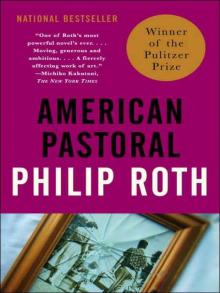 American Pastoral
American Pastoral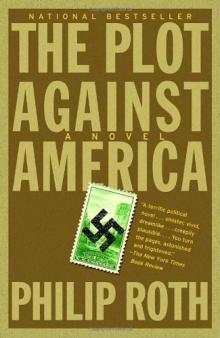 The plot against America
The plot against America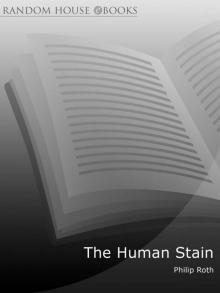 The Human Stain
The Human Stain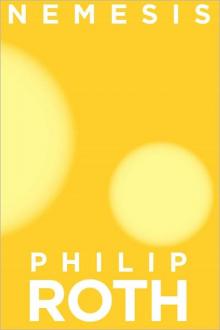 Nemesis n-4
Nemesis n-4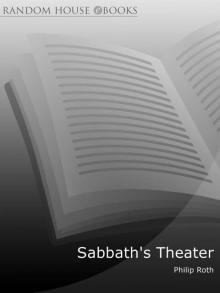 Sabbath’s Theater
Sabbath’s Theater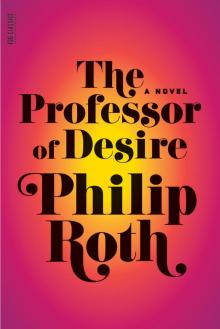 The Professor of Desire
The Professor of Desire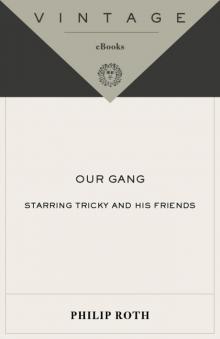 Our Gang
Our Gang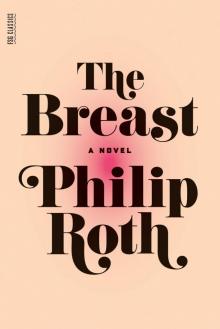 The Breast
The Breast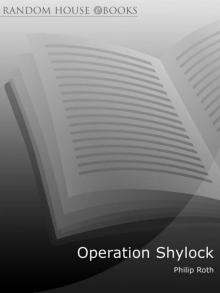 Operation Shylock
Operation Shylock The Dying Animal
The Dying Animal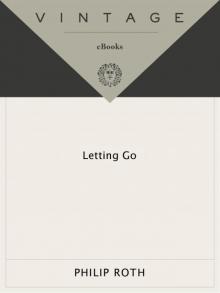 Letting Go
Letting Go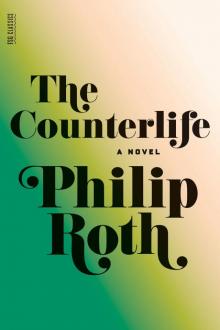 The Counterlife
The Counterlife Everyman
Everyman Nemesis
Nemesis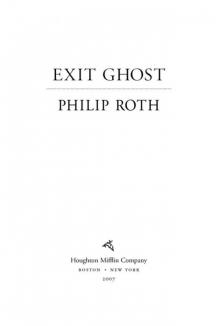 Exit Ghost
Exit Ghost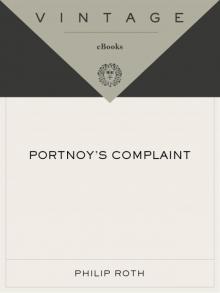 Portnoy's Complaint
Portnoy's Complaint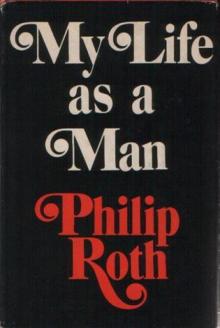 My Life as a Man
My Life as a Man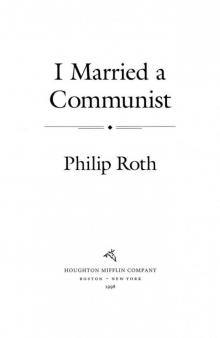 I Married a Communist
I Married a Communist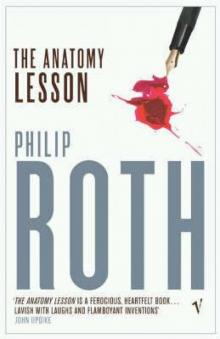 The Anatomy Lesson
The Anatomy Lesson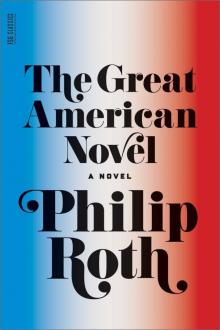 The Great American Novel
The Great American Novel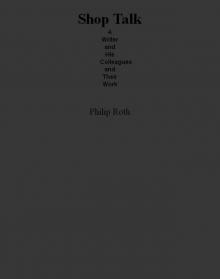 Shop Talk
Shop Talk The Humbling
The Humbling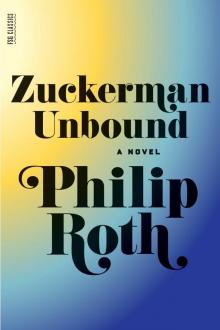 Zuckerman Unbound
Zuckerman Unbound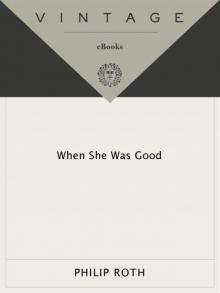 When She Was Good
When She Was Good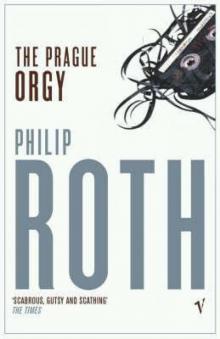 The Prague Orgy
The Prague Orgy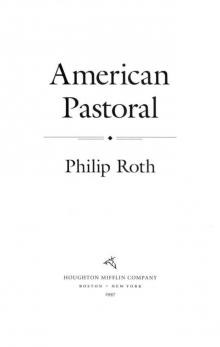 American Pastoral (Nathan Zuckerman)
American Pastoral (Nathan Zuckerman) Goodbye, Columbus
Goodbye, Columbus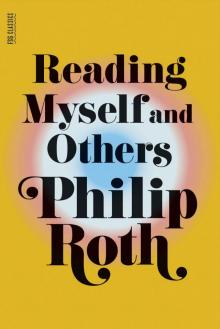 Reading Myself and Others
Reading Myself and Others